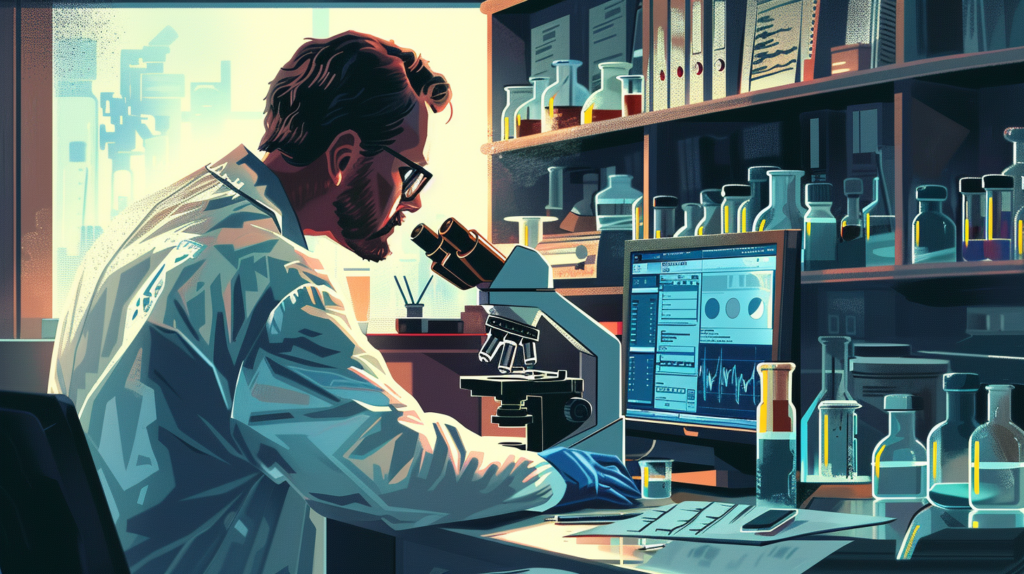To enhance drug testing protocols in 2024, we recommend utilizing advanced testing technologies like mass spectrometry for accurate detection. Implementing randomized testing schedules can minimize predictability and evade tactics, while also fostering compliance. Training staff on updated procedures and enhancing chain of custody protocols are crucial for maintaining protocol integrity. Staying informed on emerging substances and conducting regular audits ensure comprehensive and up-to-date protocols. Lastly, fostering a culture of transparency and accountability promotes honesty and policy adherence. These 7 tips are essential for improving drug testing effectiveness in 2024.
Key Takeaways
- Implement mass spectrometry for accurate detection and reduced false results.
- Utilize data analytics for optimizing drug testing programs.
- Train staff on updated procedures to ensure adherence.
- Enhance chain of custody protocols to prevent tampering.
- Stay informed on emerging substances to adapt testing panels.
Utilize Advanced Testing Technologies

We recommend incorporating cutting-edge analytical instruments to bolster the accuracy and efficiency of drug testing procedures. Data analytics plays a crucial role in interpreting complex results obtained from drug tests, providing valuable insights into trends, patterns, and anomalies. By utilizing data analytics, testing facilities can enhance their decision-making processes and identify potential areas for improvement.
Mass spectrometry is a powerful analytical technique that can accurately detect and quantify various compounds present in a sample. Its high sensitivity and specificity make it an invaluable tool in drug testing, allowing for precise identification of substances even at trace levels. Integrating mass spectrometry into testing protocols can significantly enhance the reliability of results and reduce the likelihood of false positives or negatives.
Implement Randomized Testing Schedules

Implementing randomized testing schedules in drug testing protocols enhances the robustness of screening procedures and minimizes predictability in sample selection. By utilizing data analytics, organizations can strategically implement randomized schedules that optimize the effectiveness of their drug testing programs. This approach ensures that employees can’t anticipate when they’ll be tested, reducing the likelihood of evasion tactics and increasing the overall integrity of the testing process.
Randomized testing schedules also induce behavioral changes among employees by fostering a culture of continuous compliance. When individuals understand that testing could occur at any time, they’re more likely to adhere to company policies regarding substance use. This shift in behavior contributes to a safer work environment and promotes a culture of accountability.
Train Staff on Updated Procedures

Training staff on updated procedures ensures that employees are equipped with the necessary knowledge and skills to effectively implement the enhanced drug testing protocols. Staff training is a critical component of successful protocol updates, as it ensures that all team members are aware of the changes and understand how to execute them correctly.
By providing comprehensive training sessions, organizations can guarantee that their staff members are proficient in conducting drug tests, handling samples, and following the new protocols accurately.
Effective staff training on protocol updates involves interactive sessions, hands-on practice, and clear communication of expectations. It’s essential to emphasize the importance of adhering to the updated procedures to maintain the integrity and accuracy of drug testing results.
Regular refresher courses and ongoing support for staff members are also crucial to ensure that the knowledge remains current and that any additional updates are promptly integrated into their practices.
Enhance Chain of Custody Protocols

Enhancing chain of custody protocols is crucial in ensuring the accuracy and reliability of drug testing procedures. Custody security plays a fundamental role in maintaining the integrity of samples throughout the testing process. Implementing strict measures to secure the custody of samples from collection to analysis is essential in preventing tampering or contamination.
Protocol consistency is key to establishing a standardized approach that minimizes errors and discrepancies in drug testing. By ensuring that protocols are consistently followed by all staff involved in the chain of custody, the risk of mistakes or mishandling of samples can be significantly reduced. Regular training and audits can help reinforce the importance of protocol adherence among staff members.
Maintaining custody security and protocol consistency not only enhances the overall reliability of drug testing but also upholds the credibility of the results obtained. By prioritizing these aspects, organizations can instill confidence in the accuracy and validity of their drug testing procedures.
Stay Informed on Emerging Substances

Staying informed on emerging substances is crucial for ensuring drug testing protocols remain comprehensive and up-to-date. Education and awareness are key components in the prevention and detection of new synthetic drugs and designer substances that may evade traditional testing methods. By staying up-to-date on the latest trends in substance abuse, drug testing professionals can adapt their protocols to effectively identify these emerging substances.
Preventing the use of these substances requires a proactive approach that starts with understanding their chemical compositions and potential effects on individuals. Through continuous education and awareness campaigns, both within the drug testing industry and among the general public, the risks associated with these new substances can be highlighted, discouraging their use.
Incorporating emerging substances into routine drug testing panels and research initiatives is essential for early detection and mitigation of their impact. By remaining vigilant and proactive in monitoring the landscape of new substances, drug testing protocols can evolve to effectively address the challenges posed by these ever-changing trends.
Conduct Regular Audits and Reviews

Regular audits and reviews play a crucial role in ensuring the effectiveness and reliability of drug testing protocols. To maintain a robust system, we recommend the following:
- Audit Frequency: Conduct audits regularly to identify any gaps or areas for improvement in the drug testing process.
- Review Process: Implement a comprehensive review process that involves all stakeholders to gather feedback and insights for enhancing protocols.
- Documentation: Ensure thorough documentation of audit findings and review outcomes to track progress and demonstrate compliance with standards.
- Continuous Improvement: Use audit results and review feedback to drive continuous improvement efforts in drug testing protocols.
Foster a Culture of Transparency and Accountability

Creating a culture of transparency and accountability within an organization is essential for upholding the integrity of drug testing protocols. Promoting honesty and encouraging responsibility among all stakeholders involved in the drug testing process is crucial for ensuring accurate and reliable results.
Transparency involves openly communicating policies, procedures, and outcomes related to drug testing, fostering trust and confidence in the process. Accountability holds individuals responsible for their actions and decisions, promoting a sense of ownership and commitment to upholding the highest standards of conduct.
Organizations can foster transparency and accountability by establishing clear guidelines and expectations regarding drug testing protocols, providing training and support to staff members, and implementing mechanisms for reporting any potential issues or concerns.
Encouraging open dialogue and feedback channels can also help in identifying areas for improvement and addressing any lapses in adherence to protocols promptly.
Frequently Asked Questions
How Can Drug Testing Protocols Adapt to New Synthetic Substances?
Adapting drug testing protocols to new synthetic substances poses detection challenges. Staying compliant with regulations is crucial. We analyze trends, update methods, and collaborate with experts to enhance detection accuracy and ensure regulatory compliance in drug testing protocols.
What Are the Consequences of Non-Compliance With Updated Procedures?
Non-compliance with updated procedures can lead to severe legal ramifications, impacting individuals and organizations. Ethical considerations are paramount, as adherence to regulations ensures fairness and integrity in drug testing. Stay informed to avoid consequences.
How Can Organizations Ensure the Accuracy of Test Results?
To ensure accuracy of test results, we integrate technology for streamlined processes, implement quality control measures, conduct robust training programs, and utilize data analysis for continuous improvement. These strategies enhance our testing protocols effectively.
What Measures Can Be Taken to Prevent Sample Tampering?
To ensure sample integrity and testing security, organizations implement tamper detection technology and strict prevention measures. These steps safeguard against sample tampering, enhancing the accuracy and reliability of drug testing protocols in 2024.
How Do Emerging Substances Impact Current Drug Testing Methods?
Emerging substances pose challenges in drug testing due to evolving substance detection techniques and new compounds. Keeping pace with emerging trends is crucial for effective testing protocols that accurately identify these substances.
Conclusion
In conclusion, as the saying goes, ‘knowledge is power.’ By implementing these 7 tips to enhance drug testing protocols in 2024, we can stay ahead of evolving trends and technologies in the substance abuse landscape.
Utilizing advanced testing technologies, implementing randomized schedules, and fostering a culture of transparency will ensure a reliable and effective drug testing program.
Stay informed, stay vigilant, and stay committed to maintaining the integrity of your organization’s drug testing protocols.













